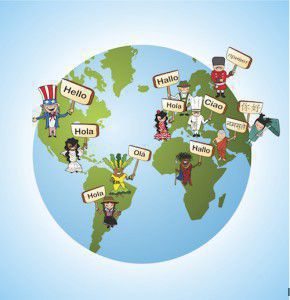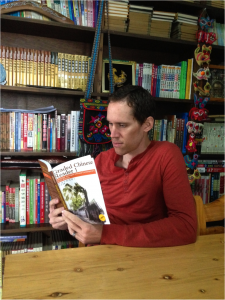8 ways to remember new vocabulary
Let’s start with a bold statement: everyone is good at languages.
I know lots of people are probably disagreeing with me right now. But the fact is, we all learnt our own language, so technically we should be able to learn another one. Right?
Of course there are lots of elements to becoming fluent in another language. Grammar. Sentence construction. Tones (for some languages). Perfecting your accent. Reading. Writing. Learning colloquial expressions. I could go on.
But let’s start at the beginning. Before you tackle any of this daunting list, you need to learn some words, or you’ll never get anywhere. And for a lot of people, a little bit of vocabulary is often enough to get by with – I survived a weekend in Naples with just a handful of essential Italian words, like ‘please’, ‘thank you’, ‘water’ and ‘cake’. (What do you mean, that’s not an essential word?)
And having spent January learning German with the uTalk app, I now feel like I could at least make myself understood in a restaurant, a shop, the hospital – although let’s hope that’s not necessary! – and I also know how to buy a train ticket or ask for the nearest cash machine. I might be far from fluent, but this is a big step for someone who knew no German at all a little over a month ago.
So, learning vocab is important. But what happens if you’re not very good at remembering stuff? Another language can look pretty terrifying at first, particularly if it’s one that bears no resemblance at all to your own. So here are a few tips for memorising new words.
The facial expressions are optional…
Start with the basics
This probably makes sense anyway – why would you learn how to say ‘Do you prefer reading or TV?’ before you’ve figured out ‘Hello’? But it’s amazing how much of a boost it is just to have a few simple words under your belt. That way, you know at the very least, you can greet someone in their own language, even if you don’t know how to say anything else.
Take it a bit at a time
Don’t try and learn everything at once. Even if you remember it at the time, by the next day your brain will almost certainly have rebelled and forgotten it all. So break it down into topics, and focus on one a day, or a week – whatever works best for you – remembering to come back to it at regular intervals to revise and make sure it’s all still in there.
Try to link it to a memory
When I find myself in a real-life situation, I try to think of how to describe it in the language I’m learning. The other morning, for example, when my train was delayed, I amused myself by remembering how to say it in German. (Yes, I’m that cool.) And now when I think of that phrase, it springs more readily to mind because I can imagine shivering on the station platform, waiting for a train that may or may not show up. It did… eventually.
Associate words with images
Another good tip – try and link words to an image or object in your mind, as it makes them easier to recall later. Even better, stick notes on things you see every day, so that when you need the word you can visualise the object with its translation attached.
Make it a game
This could be a game against someone else – see who can remember the most words, you or your friend – or against yourself, but it’s amazing how effective it can be at hardwiring the vocabulary into your brain. And the best bit is you don’t even need to win the game to be successful… The memory game in uTalk is notoriously difficult, particularly if your memory isn’t the best. I struggled with the fruit and vegetables sections, for some reason; I just couldn’t remember where they all were when the cards were covered, and after the tenth attempt, I was ready to throw my phone across the room. But by the time I was done, I knew all the names of the fruits and vegetables forwards and backwards, and can’t see myself forgetting them any time soon.
Try and connect it to your own language
Even if the language you speak every day is completely different to the one you’re learning, use your imagination. For ‘I had a good time’, which is ‘Mir hat es sehr gut gefallen’ I found the only way to remember it was to think of it as ‘my hat is very well fallen’. It makes no sense, but it works for me!
Talk to other people
Sometimes, telling someone else how to say something can help to cement it in your mind, even if they have no idea what you’re saying. I’ve been cheerfully saying random German words to my startled family and friends for a month now, and although most of them have no idea what I’m talking about, it helps me to say the words aloud to someone other than myself.
Study before you go to sleep
I don’t know if this will work for everyone, but I found it was quite effective. By revising the vocabulary at night before I go to sleep, I find it’s fresh in my mind when I wake up. Probably not recommended if you have trouble switching your brain off at night (not something I have a problem with, clearly).

Does anyone have any other tips for remembering vocabulary?
Liz
6 great language learning blogs to visit in 2015
So how’s everyone’s 2015 going? We hope your year has got off to a great start, and that your new year’s resolutions are all still intact…?
 We’d like to start the year by thanking you all for reading our blog. With a bit of luck, at some point over the last couple of years it’s inspired you, made you smile or just entertained you for a few minutes. We love sharing our thoughts on languages and everything connected to them (sometimes fairly tenuously connected!) so please do keep coming back. Remember, you can subscribe by email to get all our posts delivered straight to your inbox 🙂 And as always, we love hearing from anyone who’d like to be a guest blogger, or with suggestions on topics you’d like to see covered.
We’d like to start the year by thanking you all for reading our blog. With a bit of luck, at some point over the last couple of years it’s inspired you, made you smile or just entertained you for a few minutes. We love sharing our thoughts on languages and everything connected to them (sometimes fairly tenuously connected!) so please do keep coming back. Remember, you can subscribe by email to get all our posts delivered straight to your inbox 🙂 And as always, we love hearing from anyone who’d like to be a guest blogger, or with suggestions on topics you’d like to see covered.
But today we wanted to share with you a few other fantastic language learning blogs that we’ve discovered, which are full of great suggestions, advice and ideas. Please share your own favourites with us in the comments, and we’ll add the best ones to our list!
FlashSticks is a UK-based company with a simple yet ingenious idea – vocabulary flashcards on colour-coded sticky notes. Their Sticky Blog is a treasure trove of fantastic articles written by the FlashSticks team, who clearly know a thing or two about learning languages. They also have a really fun and friendly Twitter account, so they’re well worth a follow there too.
We recommend: 6 tips for getting out of a language learning rut
Lindsay Dow is a language fan who’s also an English tutor. Her blog is a great mix of written articles and videos, and includes learning advice as well as lots about language in popular culture like movies and music. Right now, Lindsay’s running a fantastic photo challenge over on Instagram, which looks like a lot of fun and a great way to learn.
We recommend: 82 British TV shows to help with your English
Sam Gendreau, the polyglot behind this great language site, is passionate about helping other people learn a language. His blog is full of useful and interesting articles, perfect for those with a language addiction or just a passing interest. We challenge anyone to visit Lingholic and not come away feeling inspired and encouraged.
We recommend: Ten amazing reasons why you should learn a foreign language
Ok, so we’re a bit biased because the author of this blog is a former EuroTalker. But that doesn’t change the fact that it’s a great site. As a self-pronounced language geek and freelance translator, she really knows her stuff. Visit the blog for tips and advice for language learners, translators… and anyone interested in how to be British.
We recommend: Don’t be scared… How to get talking in your foreign language
Probably most people already know this blog, as its creator, Benny the Irish Polyglot, is pretty famous these days. Benny is the perfect example of someone who struggled with languages at school but has since fallen in love with them. Since 2003, he’s been travelling the world, learning new languages (in three months) and sharing his experiences and advice.
We recommend: How to make a New Year’s Resolution and actually keep it
Not a language learning blog as such, but so much fun. James is an illustrator from the UK who draws fantastic pictures all based on languages from around the world. His collection includes everything from how to sound like a monkey in different languages to literal translations of the titles of popular TV shows. Be warned though, you may find it hard to drag yourself away.
We recommend: The sounds of the New Year
There are lots more fantastic language blogs out there, so please don’t be offended if we didn’t mention yours this time…
Enjoy!





